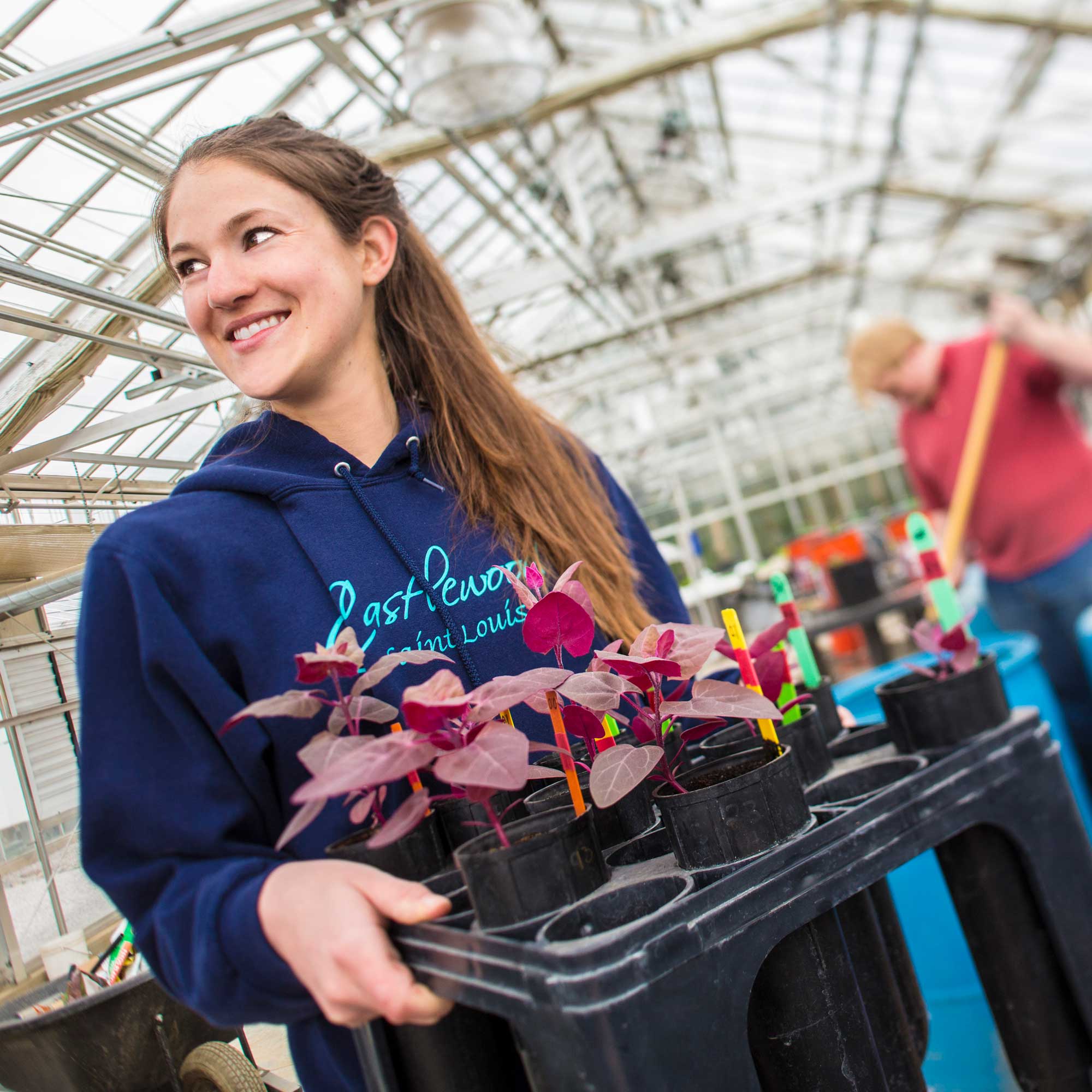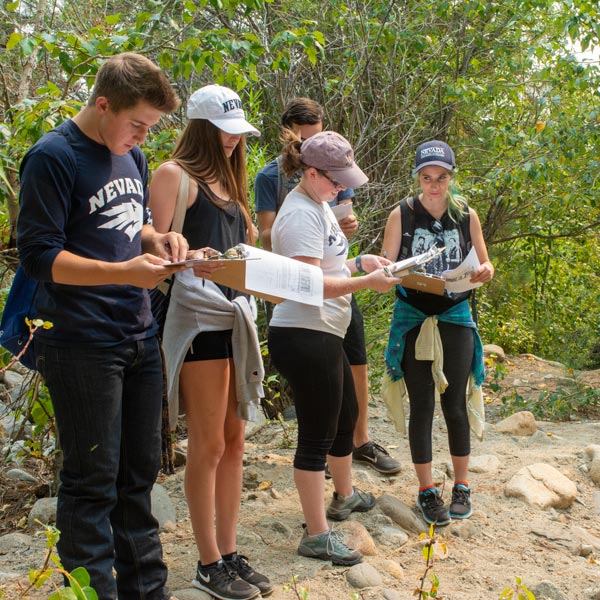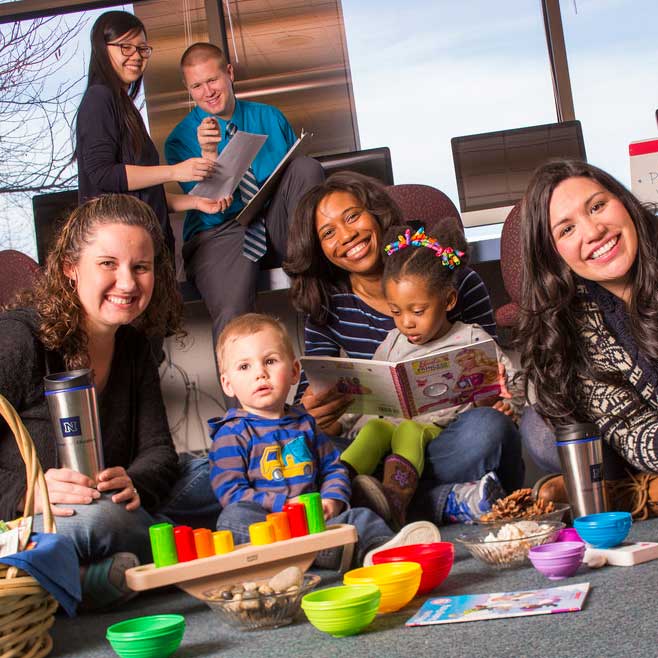In this edition
- College’s Marjorie Matocq receives $3 million to train students at the interface of biology and chemistry
- Research into precision irrigation management of alfalfa begins
- Alum brings vision of inclusiveness as new Biotechnology Program director
- New Experiment Station senior assistant director to continue ag productivity
- Vegas PBS highlights Extension’s youth horticulture success
About our College
A founding college of the University, we have a long tradition of excellence in teaching, research and engagement programs that benefit the health and economic vitality of Nevada. We offer programs in:
- agriculture, horticulture, rangeland and veterinary sciences
- biochemistry and molecular biology
- children, youth and families
- community and economic development
- health and nutrition
- natural resources and environmental science
College’s Marjorie Matocq receives $3 million to train students at the interface of biology and chemistry
National Science Foundation grant supports graduate students in new University chemical ecology program
Jennifer Kent and Ashley Andrews
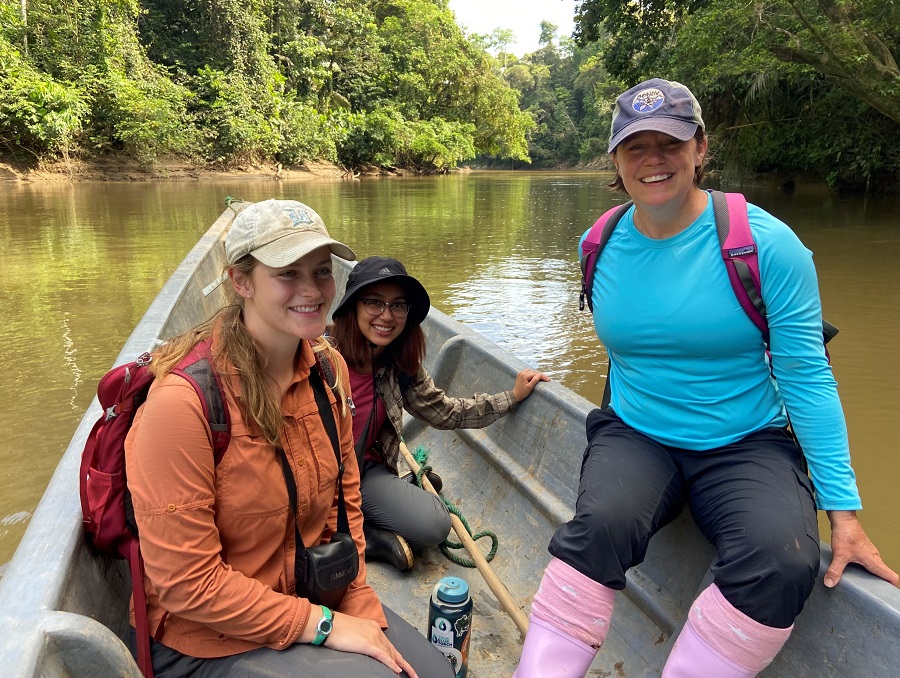
Graduate students Haley Dole (left) and Chanchanok Sudta, and Assistant Professor Lora Richards (right) explore Amazonian Ecuador to investigate how plant chemistry mediates ecological interactions. Photo by Tod Swanson.
A new area of graduate study born out of the University’s Hitchcock Center for Chemical Ecology will train students at the interface of biology and chemistry through cutting-edge approaches in ecology, genomics, bioinformatics and chemistry. Supporting the initiative is a $3 million National Science Foundation Research Traineeship Program Grant.
“Some of the most exciting scientific discoveries will come from the intersection of traditional disciplines,” Foundation Professor in the College Marjorie Matocq, director of the University’s interdisciplinary Ecology, Evolution & Conservation Biology Graduate Program, said.
Matocq is the principal investigator on the grant, from which 70 graduate students are expected to receive support. Leading the new initiative with Matocq are College of Science faculty Casey Philbin, Lora Richards, Lee Dyer and Christopher Jeffrey.
"This grant will support the training, research innovation and collaborations that allow us to pursue answers to the big questions in science," Jeffrey said.
It can spur innovation in industries ranging from pharmaceuticals to agriculture, strengthening management of natural resources, and generating discoveries that keep Nevada’s universities at the forefront of science and innovation.
Training the next generation of scientists
“Discoveries in this area require the pulse of innovation that can only come from the engagement of graduate students. This program will be a model for training the next generation of scientists who will lead research into some of the world’s most pressing problems.” – Professor Marjorie Matocq
Research into precision irrigation management of alfalfa begins
Project includes software supported by sensors to help farmers make better watering decisions
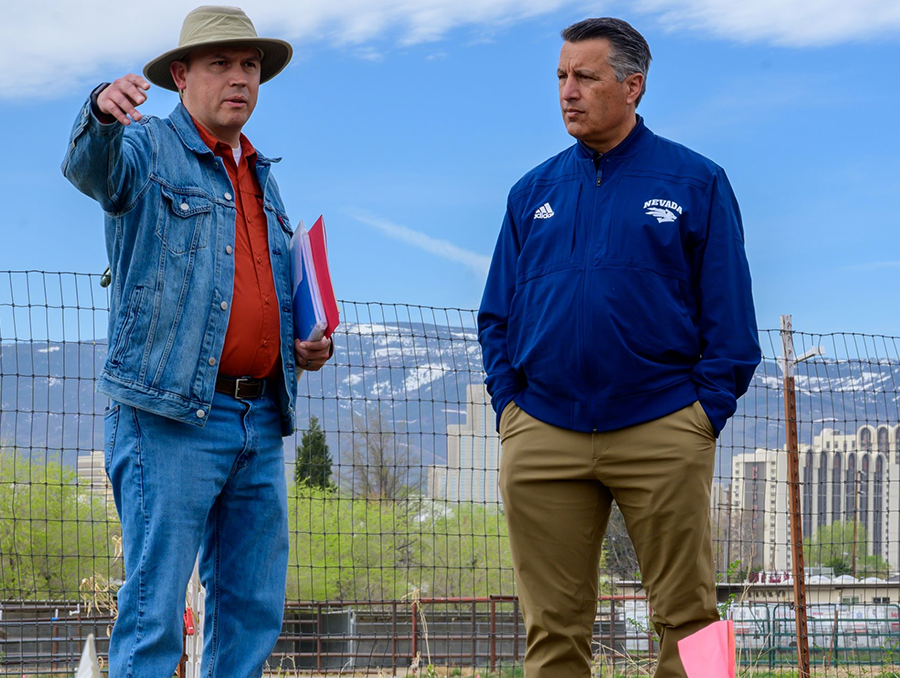
Alejandro Andrade-Rodriguez (left) discusses his research with University President Brian Sandoval at the College’s Valley Road Field Lab Experiment Station. Photo by Robert Moore.
A three-year research project led by Assistant Professor in the College Alejandro Andrade-Rodriguez will develop open-source software to help farmers better manage water supply, especially for Nevada’s crucial crop of alfalfa. The project is funded by the U.S. Department of Agriculture and in collaboration with UC Davis and USDA’s Agricultural Research Service in Bushland, Texas.
“Precision irrigation allows irrigation systems to apply variable amounts of water to a field, which can lead to water savings,” Andrade-Rodriguez said. “These systems allow water to be applied in the right amounts required by plants growing in different parts of a field.”
Yet, adoption of these systems has been slower than expected, in part because there is a lack of decision support systems capable of estimating the water requirements for a field’s different sections.
To help, Andrade-Rodriguez previously developed the decision support software ARSPivot. In this project at the College’s Valley Road Field Lab Experiment Station, Andrade-Rodriguez will improve ARSPivot to support center-pivot and linear-move systems from multiple manufacturers, work with UC Davis to add modeling functionality that predicts the best irrigation management decisions to make, test the upgraded software on alfalfa, and release it as open source.
He said, “The idea is to open it up to others, so the technology can only improve.”
Helping farmers, saving water
“Having a decision support system that reduces the amount of water used in agriculture can help farmers and ranchers in Nevada reduce the negative effects of a limited water supply.” – Assistant Professor Alejandro Andrade-Rodriguez
Alum brings vision of inclusiveness as new Biotechnology Program director
Karla Hernández brings her previous experience at the University to her new roles with the College
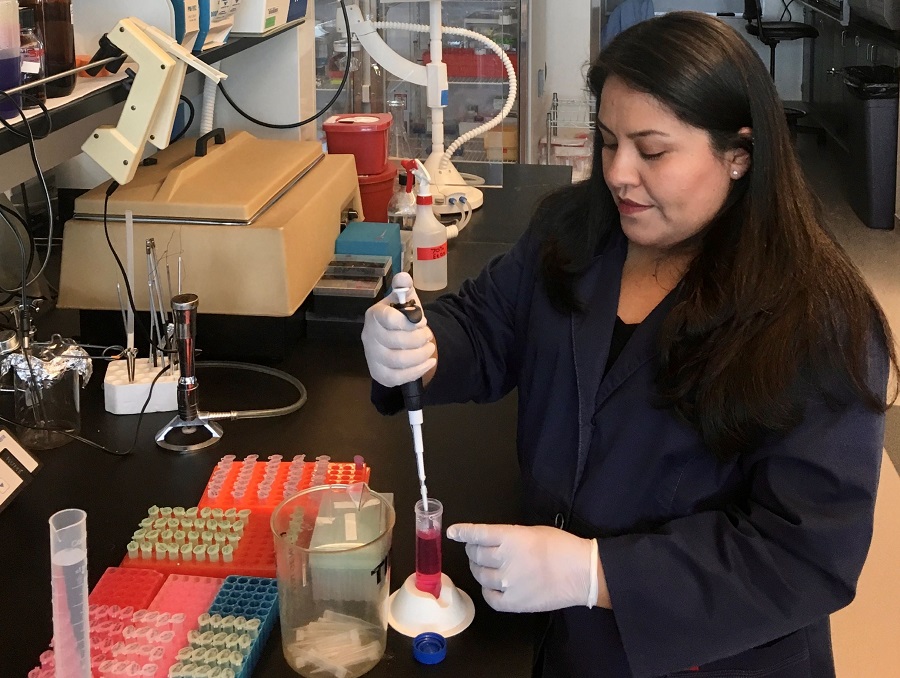
Karla Hernández conducts research at the University’s School of Medicine. Photo by Miguel Hernández-Lara.
A triple-degree alum of the University who was a first-generation student is the new director of the College’s Biotechnology Program.
Karla Hernández, who will also serve as a teaching assistant professor in the College’s Department of Biochemistry & Molecular Biology, obtained her bachelor's and master's degrees from the College, earned a doctoral degree in cell and molecular biology from the University, and completed a postdoctoral research fellowship with the University’s the School of Medicine.
Hernández enjoys mentoring and guiding students from diverse backgrounds to achieve their academic goals. She is collaborating with faculty from the College to establish the first chapter of the Society for Advancement of Chicanos/Hispanics & Native Americans in Science in the state of Nevada.
She conducts research as part of the College’s Experiment Station unit, has presented her research at national and international conferences, is the author of peer-reviewed scientific articles, and contributed a chapter to the book, “Success for All: Programs to Support Students Throughout Their College Experience.”
Advocating for our future leaders
“I am committed to advocating for student wellness and success while incorporating innovations into the curriculum to assure the Biotechnology Program continues to train the next generation of scientists and innovators to lead in the evolving field of biotechnology.” – Director Karla Hernández
New Experiment Station senior assistant director to continue ag productivity
Scott Huber aims to continue tradition of success at College’s Experiment Station
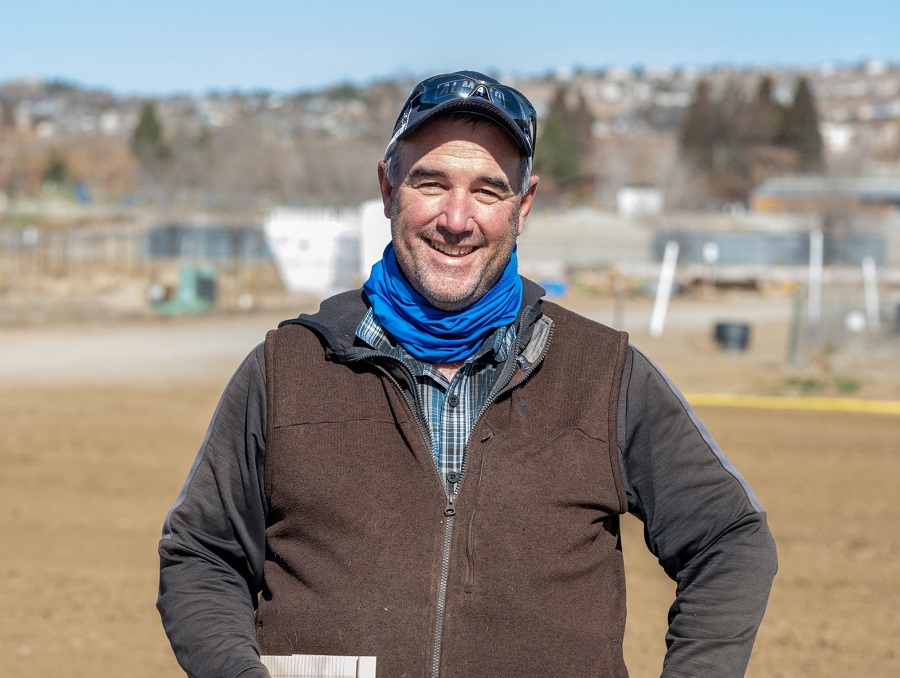
Scott Huber has been named the new senior assistant director of the College’s Experiment Station.
The College has hired Scott Huber as the new senior assistant director of its Experiment Station unit. With nearly 30 years as a private ranch manager and five years with the Experiment Station, Huber brings the knowledge and experience needed to direct the research and programs being carried out at the Experiment Station’s various research and production facilities across the state.
The College’s Experiment Station unit is part of a national network of experiment stations. The unit maintains field stations, laboratories and ranches throughout the state where research is conducted on important issues related to agriculture and ranching, community development and economics, human health and well-being, water and wildlife, and more. Huber is developing ranch management plans for each of the properties.
“A ranch management plan allows us to establish specific goals that are aligned to the mission and vision of our Experiment Stations,” Huber said. “This becomes a working document that is continually evaluated and monitored for progress.”
Demonstrating ag leadership
“I am delighted that Scott has accepted this position. Scott is uniquely qualified to serve in this role due to his experience as a ranch manager and his demonstrated leadership over the past several years as assistant director for research for the Experiment Station.” – Experiment Station Director Chris Pritsos
Vegas PBS highlights Extension’s youth horticulture education success
Extension’s Youth Horticulture Education Program empowers local school gardening skills
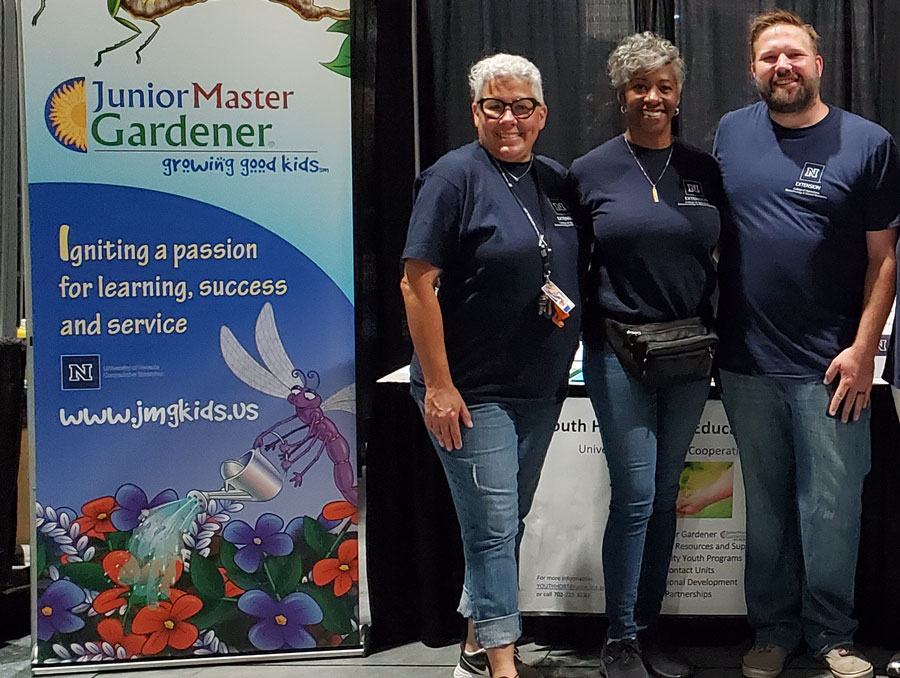
Meet the team behind the success of Extension’s Youth Horticulture Education Program (left to right – Nicole Hansen (community instructor), Tricia Braxton Perry (program officer) and Taylor Quiram (community instructor).
Crops cannot thrive in a desert, right? Well, students at Bruner Elementary in the Clark County School District are debunking that myth, thanks to the school’s partnership with Extension’s Youth Horticulture Education Program and the federally funded 21st Century Community Learning Centers, an after-school enrichment program for underserved schools.
Since 2019, Extension has collaborated with Dana Brown, Bruner’s learning centers site manager, to implement the Junior Master Gardener Program, along with the Learn, Grow, Eat and Go! Curricula, to meet federal grant requirements. This effort has led to more than 50 students earning the globally recognized Junior Master Gardeners certification.
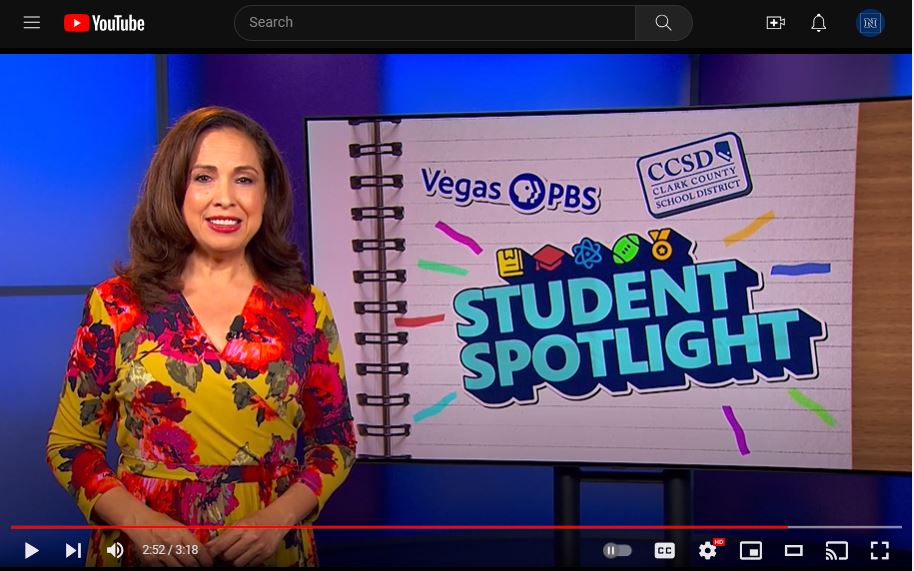
The success of this partnership was recently featured in Vegas PBS Student Spotlight.
Partnering for success
“Extension horticultural experts, who are also members of the 21st Century Advisory Board, have provided direct monthly instruction sessions rooted in the Junior Master Gardener and the Learn, Grow, Eat, Go! curriculums to our teachers and students since our partnership began. Working with them has been the bedrock of our program’s success.” – Site Manager Dana Brown
Innovating for Nevada
Our programs work together to make an impact
Our teaching, research and engagement programs are intertwined and complement one another. Faculty who teach on campus also conduct research as part of our Experiment Station, allowing students to learn about and participate in research. Extension faculty engaging with communities identify research needs, as well as join Experiment Station faculty to conduct research. Faculty on campus help to develop Extension programs in communities.
